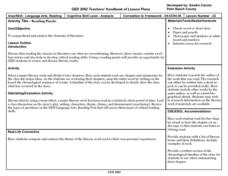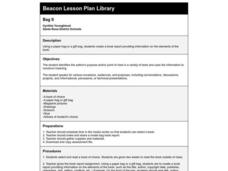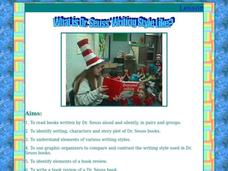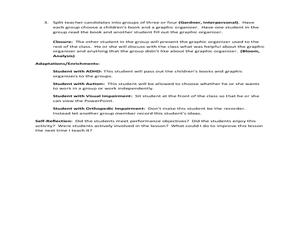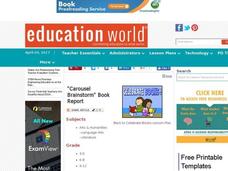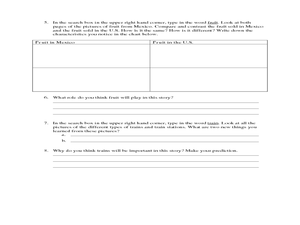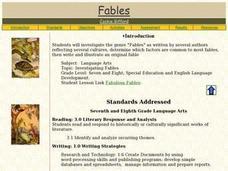Curated OER
Identifying Science Fiction
Students discuss works of science fiction that they read, highlight aspects that made each a part of science fiction genre, identify formal literary elements, and discuss ways each can be developed through science fiction.
Curated OER
Reading Puzzle
Twelfth graders examine the elements of literature. They each read a chapter of a novel, sequentially list the main ideas, present a summary of the chapter to the class, sequence the events, and review the novel by summarizing the timeline.
Curated OER
Picture Perfect: Reading and Narrative Writing
Students will create a fictional narrative based on the cover of a picture book provided by the teacher. In this narrative writing lesson students incorporate all story elements and use strategies to engage the reader.
Curated OER
In the Pilot's Seat
Students examine a review of several of the new television series launching in the Fall 1999 season and interpret how a critic discusses the notion of 'repurposing' old shows. They work in small groups to create basic character sketches...
Curated OER
Creating Comic Strips
Students recognize the elements needed to create a comic strip. In this comic strip instructional activity, student understand that comic strips need words and pictures. Students find differences and similarities in comic strips....
Curated OER
Bag It
Students create a book report in a bag. They include items that explain the elements of the story and share them with the class.
Curated OER
Shadow Puppets
Students examine the role of shadow puppets. They create their own puppet and put on a play.
Curated OER
Dr. Seuss
Learners read books by the same author and compare what they find. In this Dr. Seuss instructional activity, students learn about Dr. Seuss' writing style, listen for the rhyme scheme in his stories, and create a KWL chart on Dr....
Curated OER
Show Me the Story
Learners examine the elements of a story, read a review of Chris Rock's new sitcom, "Everybody Hates Chris" and create original sitcom episodes based on their own lives.
Curated OER
Writing Folktales
Students consider the structure of folktales. In this writing skills lesson, students list the attributes of folktales that they read in class. Students then complete handouts based on the elements of the tales as well as types of tales...
Curated OER
Graphic Organizer Lesson
Students investigate how to use graphic organizers. In this literary elements lesson, students are introduced to several types of graphic organizers and their purpose. Students read a book of their choice and complete a graphic organizer...
Curated OER
Understanding: Television
Students discuss their experiences with television. They break into small groups and go through the steps of producing a television show themselves. Their presentations are made to the entire class.
Curated OER
The Teller of the Tale, Part 3
Students practice use of volume, stress, pacing, enunciation, eye contact, and gestures needed to meet the needs of the audience when presenting their own tales based on Chaucer. They receive teacher and student feedback and prepare to...
Curated OER
Carousel Brainstorm Book Report
Students participate in a group review activity to analyze and discuss a book they have all read. They write a paragraph summarizing the findings related to one of the topics. Older students might summarize three topics or all the topics.
Curated OER
Is This a House for Hermit Crab?
First graders identify text that uses sequence or other logical order. They identify and interpret how different plants and animals inhabit different kinds of environments and have external features that help them thrive in different...
Curated OER
Writing Myths
Students read and write myths. In this world mythology instructional activity, students read and analyze myths from various cultures and then recognize their attributes as they write their own myths that explain natural phenomena.
Curated OER
Alexander and the Terrible, Horrible, No Good, Very Bad Day
Learners investigate storytelling by analyzing images in a book. In this reading analysis lesson, students read and analyze the book Alexander and the Horrible, No Good, Very Bad Day. Learners observe the illustrations in the...
Curated OER
Ornithology and Real World Science
Double click that mouse because you just found an amazing instructional activity! This cross-curricular Ornithology instructional activity incorporates literature, writing, reading informational text, data collection, scientific inquiry,...
Curated OER
Esperanza Rising - Anticipation Guide
Learn about Mexican culture while simultaneously strengthening reading, writing and computer skills. In order to get the most out of Esperanza Rising, pupils should have prior knowledge of Mexican culture. Therefore, there are links to a...
Mary Pope Osborne, Classroom Adventures Program
Mummies in the Morning Egyptian pyramids, hieroglyphics
Visit the Magic Treehouse and take your class on a trip through time with a reading of the children's book Mummies in the Morning. Using the story to spark an investigation into Egyptian culture, this literature unit engages...
Curated OER
Thrilling Information: Music and Reading
Here’s a cross-curricular program music activity that uses Peer Gynt to engage class members. Groups take one section of “In the Hall of the Mountain King,” choreograph their section of the tune to represent the story as they imagine it,...
Curated OER
Dragonwings: Evaluate Chapters 10-12
As your class finishes the novel Dragonwings, use these culminating projects. A vocabulary list is given for chapters eleven and twelve and either an epitaph or letter activity concludes the book. The final project consists of creating a...
Curated OER
Knights of the Round Table adapted by Gwen Ross
Everyone loves the tales involving King Arthur and his knights. After reading Knights of the Round Table by Gwen Gross, learners draw inferences and conclusions, analyze story elements, and discuss figurative language, including...
Curated OER
Investigating Fables
Time for a story! Learners of all ages enjoy listening to stories, so read them some common fables and have them work cooperatively to create a fable. Differentiate for varying ability levels by providing sentence frames, graphic...
Other popular searches
- Setting Plot Main Characters
- Plot, Characters and Setting
- Plot Characters and Setting
- Setting Plot Characters

